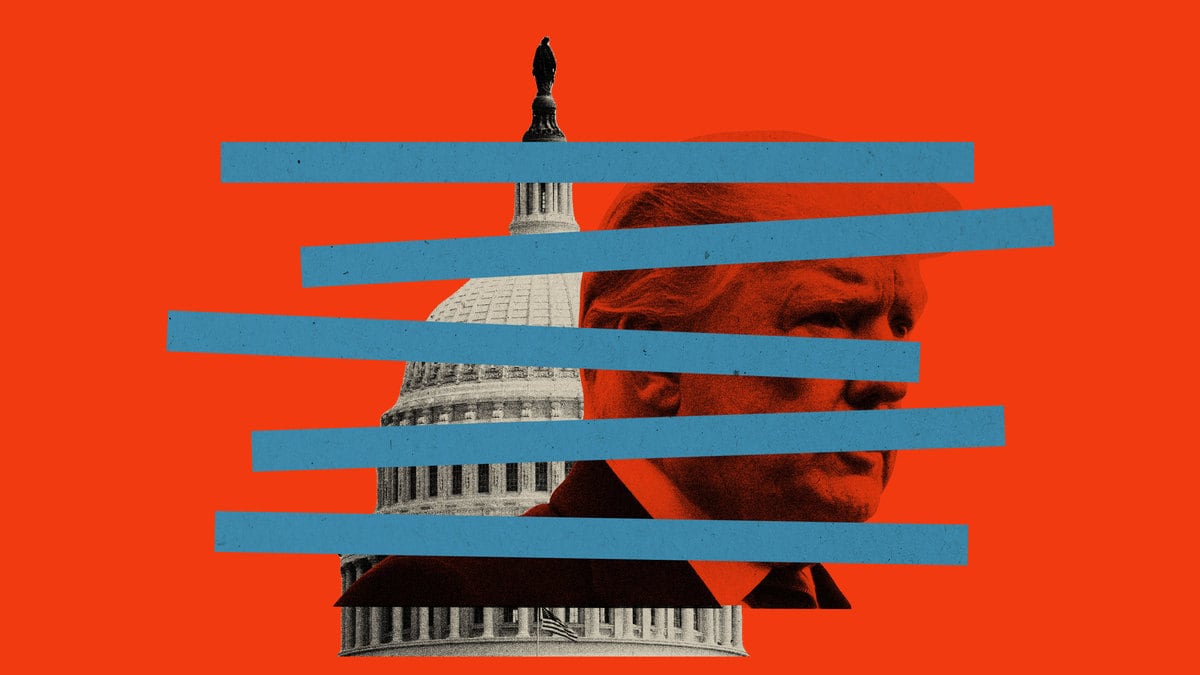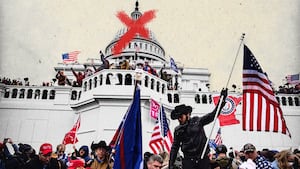By laying out damning evidence in court last week that former President Donald Trump actually defrauded the United States, the Jan. 6 Committee has made a huge bet—with a potentially disastrous downside.
A federal judge in California will soon decide if there’s enough evidence to show that Trump likely engaged in a criminal scheme to stay in power with the help of his lawyer, John Eastman. If he does, then the Select House Committee investigating the Jan. 6 insurrection has a shot at getting Eastman’s potentially damning emails—along with criminal evidence against Trump himself.
But first, it’ll come down to a relatively dull procedural court ruling, in which U.S. Judge David O. Carter has to decide if there’s enough suspicion to overcome the usual secrecy afforded an attorney-client relationship.
Don’t expect any handcuffs yet.
“We’re a long way from a criminal complaint,” said Jessica A. Levinson, a law school professor at Loyola Marymount University. However, she added, “But again, it’s the strongest connection we’ve seen between… Trump’s conduct regarding the 2020 election and possible criminal exposure.”
In summary, she said, “it’s a big deal.”
If the judge concludes there’s probable fraud, his ruling would generate scathing headlines backed by the authority of a judge with 23 years on the bench (and a bulletproof resume as a prosecutor and Vietnam Marine vet.) And with that, there will be mounting political pressure on the Department of Justice to finally investigate the former president and take decisive—and historic—action against him.
“The emails we’ve seen are already pretty damning,” said University of Colorado associate professor of law Douglas M. Spencer. “There would have been a finding of criminal fraud accepted by a judge that will color people’s views of what was happening on January 6.”
However, there is a flip side to this question.
If the judge rules those emails can stay secret, it will cast a shadow of doubt over the congressional panel’s attempts to hold Trump accountable. And it could actually make it harder for the FBI and Department of Justice to go after the former president, according to current and former prosecutors who spoke to The Daily Beast.
Any attempts to get a search warrant on Trump would have to note that another judge somewhere has already ruled on this and found nothing.
And when it comes to the Biden-era Justice Department, Trump quite possibly has little to worry about—at least that’s what his lawyers are telling him.
Since last year, according to a source familiar with the matter and another person briefed on the situation, when Trump has privately asked people what they think Attorney General Merrick Garland could have in store for him, attorneys and close advisers to Trump have repeatedly reassured the ex-president that Garland is unlikely to criminally pursue Trump.
Several lawyers have already sought to allay the former president’s concerns by telling him they believe Garland to be an institutionalist who, among other things, is highly risk-averse to setting a precedent that could easily be wielded—in good or bad—against Democratic presidents.
In these conversations, the sources said, Trump will sometimes agree with associates who say that Garland likely is not prepared to open that can of worms. However, the former president is fond of saying that if the Biden administration were to go that route, Trump’s followers are so devoted they would take to the streets in mass protest and relentlessly confront the Democratic officials and politicians who “did that to Trump.”
This cultish sentiment—coming from the man who largely instigated the deadly Capitol assault last year—is something that Trump has already previewed at his post-presidency rallies.
“If these radical, vicious, racist prosecutors do anything wrong or illegal, I hope we are going to have in this country the biggest protest we have ever had in Washington, D.C., in New York, in Atlanta, and elsewhere, because our country and our elections are corrupt,” Trump said at a Texas rally in late January, as he continued spreading his anti-democratic lies about Biden’s decisive victory in the 2020 presidential contest.
“At the end of the day, he gave a speech, and if the Jan. 6 committee wants to accuse him of inciting a riot, that’s an exceedingly difficult case to make under any circumstances, so it doesn’t surprise me that Trump’s lawyers are telling him that,” Steven Groves, who worked as an attorney and then as a spokesperson in the Trump White House, said on Sunday. “There is very specific case law out there about incitement and whether a speech would meet those elements.”
The Jan. 6 committee’s inability to file criminal charges on its own—and its dependence on the DOJ to do so—is one reason why legal scholars are starting to doubt that Trump will actually go down for his role in inciting the insurrection.
Prosecutors are likely to insist on written evidence that Trump knew his actions were illegal but was forging ahead anyway—a high and unlikely bar given how Trump operates, communicating to lieutenants through jeering and innuendo, and avoiding email at all costs.
“We say nobody’s above the law, but in practice, the president is above the law. Once 80 million people say they support you to be their political leader, that does create some protection against legal action, because it will always raise the question of a political prosecution,” Spencer, the University of Colorado law professor, told The Daily Beast.
But, as expected, the lackeys might still get burned.
“It’s likely John Eastman will be criminally charged and disbarred, and other people around his orbit will suffer consequences,” Spencer added.
The evidence displayed by the Jan. 6 Committee last week was thorough and sweeping.
In a legal memo backed by sworn depositions and emails, congressional investigators laid out a compelling case that Trump personally engaged in a criminal conspiracy to defraud the very nation he led and then obstructed an official proceeding of Congress. It explained in detail how Trump spread lies about election fraud, even as top DOJ officials repeatedly informed him his assertions were false. And it described how Trump schemed to block Congress from certifying the votes showing that Joe Biden beat him at the polls.
Even Eastman’s legal team recognized the committee’s remarkable legal memo for what it was. In court documents on Friday, the team described the committee’s memo as “effectively a draft criminal indictment against former President Trump and various named and unnamed alleged coconspirators.”
The bulk of evidence unveiled Friday shed additional light on just how aggressively Trump continued on his campaign of deceit.
Snippets of a sworn deposition showed that Richard Donoghue, who served as the deputy attorney general and was interviewed by the committee behind closed doors, recounted how Trump tried to manipulate the DOJ into pushing his election conspiracy lies.
“I told the President myself that several times, in several conversations, that these allegations about ballots being smuggled in in a suitcase and run through the machines several times, it was not true, that we had looked at it, we looked at the video, we interviewed the witnesses, and it was not true,” he said, according to a transcript of his October 2021 testimony.
“But he wanted us to say that it was corrupt,” Donoghue continued. “And this was consistent with some things he said at other points about, the Department should publicly say that the election is corrupt or suspect or not reliable. At one point, he mentioned the possibility of having a press conference. We told him we were not going to do that.”
Donoghue told Trump that the supposed 68 percent error rate in Michigan ballots was actually 0.0063 percent error rate, less than 1 in 15,000. The disappearing briefcase stuffed with Trump ballots in Georgia wasn’t really a briefcase and it never disappeared—and video proved that. The tractor trailer driver who claimed a truck full of ballots was moved from New York to Pennsylvania was bogus—and federal agents knew that, too, because they’d interviewed the people who loaded the truck and unloaded it more than 100 miles away.
The president insisted anyway.
Jason Miller, a former Trump spokesman, told the committee that the president was explicitly told by his own campaign data advisers that he was bound to lose at a meeting that included son-in-law Jared Kushner, campaign manager Bill Stepien, and attorney Justin Clark. Yet Trump refused to believe the frank assessment from Matt Oczkowski, a former top employee at the infamous Cambridge Analytica who continued to assist Trump in the 2020 election.
And despite the facts plainly showing Trump’s days in the White House were numbered, Trump kept pressuring Vice President Mike Pence to buck the U.S. Constitution and unilaterally reject votes in key states up until the very end.
Pence’s national security adviser, retired U.S. Army Lt. Gen. Keith Kellogg Jr., recalled a conference call on the morning of Jan. 6 in which Trump insisted Pence “has legal authority to send these folks back to the respective states.” Pence’s chief of staff, Marc Short, also confirmed the details of that call to the committee. And the secret White House schedule that day, also obtained by the committee, reflects that Trump had a “c w/ VPOTUS” at 11:20 a.m.
At the time, the Trump administration had taken to just telling the public—as they frequently did near the end of his term—that “President Trump will work from early in the morning until late in the evening. He will make many calls and have many meetings.”
The committee hopes that the federal judge will allow them to access emails that will provide crucial details on what Eastman advised Trump during those tumultuous final days in office, and maybe even clues into whether Trump fully acknowledged that what he was doing was morally reprehensible and outright illegal.
Then it’s a race to accumulate the evidence before the committee’s planned public hearings in the spring.
“The committee will still have to finish its work then vote on a criminal referral and then of course the Department of Justice will make its own assessment,” Levinson, the legal scholar, told The Daily Beast.
But generating suspicion of fraud is one thing, and proving actual fraud in criminal court is another. Judge Carter made that clear on Friday, when he emphasized how important any eventual involvement from the DOJ would be—and the added difficulty of securing criminal charges against anyone.
“Dr. Eastman’s liberty is not at issue—only his emails,” he wrote. “The legislature raises allegations of crime in the limited context of privilege; but it is the executive branch that is solely responsible for deciding whether to prosecute. For Dr. Eastman to risk incarceration, there would have to be entirely separate criminal proceedings, where the government would face a substantially higher burden of proof and Dr. Eastman would receive the full protections of criminal law.”












